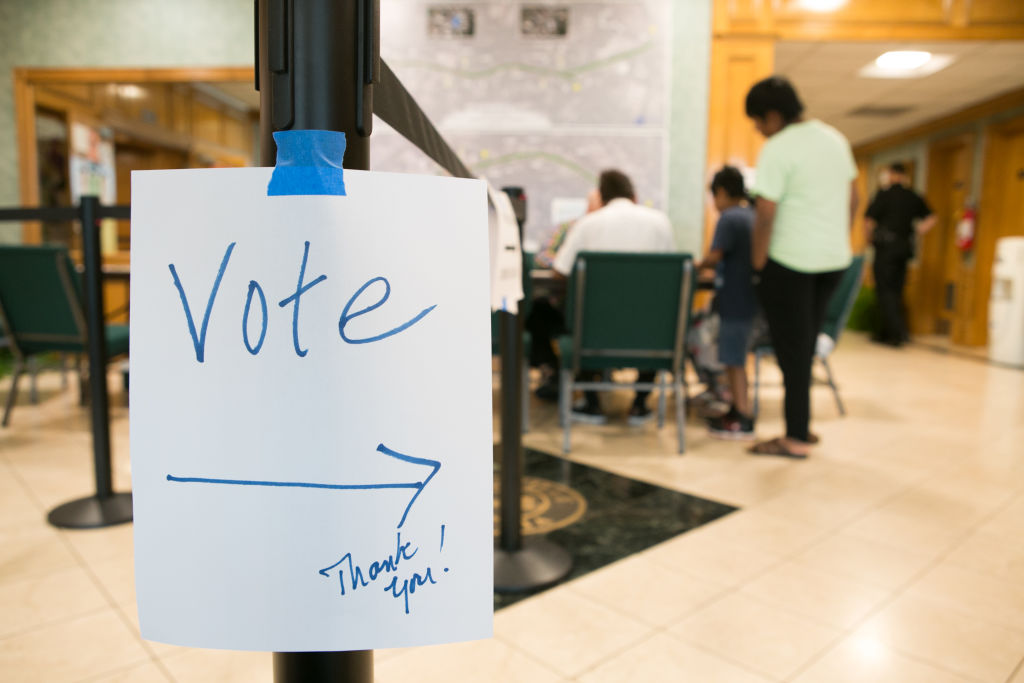The Trump administration is reportedly targeting minority voters using the Americans With Disabilities Act


A free daily email with the biggest news stories of the day – and the best features from TheWeek.com
You are now subscribed
Your newsletter sign-up was successful
The proposal to close seven of nine polling places in majority-black Randolph County, Georgia, has drawn national attention and legal challenges. Proponents of the plan, including a consultant recommended by Georgia Secretary of State Brian Kemp (R), say the seven polling places run afoul of the Americans With Disabilities Act (ADA), although many are in public buildings like fire stations. (Kemp, who has a long history of purging voter rolls and targeting black voters, opposes the Randolph County plan; he is also the GOP nominee for governor, running against Democrat Stacey Abrams, who is black.)
But the Georgia officials aren't the only ones using the ADA, "intended to protect the nation's disabled communities, as a pretext to disenfranchise minority voters," says Kira Lerner at ThinkProgress. Under President Trump, the Justice Department's Disability Rights Section "has settled at least five enforcement actions in counties across the country where polling locations do not meet the stringent requirements of the ADA," and four of those five "have significant minority populations." In the 10 years before Trump took office, Lerner notes, "the Justice Department settled just nine ADA enforcement actions related to polling locations."
Jim Tucker, a former DOJ Voting Section lawyer who's part of the Native American Voting Rights Coalition, tells ThinkProgress the Justice Department is also targeting polling stations in at least three largely Native American counties using ADA violations. "It's a diabolical move: Citing one civil rights statute (the ADA) as the justification for violating another," the Voting Rights Act, he said. "They are deliberately targeting not just Native Americans areas and polling places on tribal land, but they're generally targeting polling places that are in predominantly minority communities, and that's extremely problematic." You can read more at ThinkProgress.
The Week
Escape your echo chamber. Get the facts behind the news, plus analysis from multiple perspectives.

Sign up for The Week's Free Newsletters
From our morning news briefing to a weekly Good News Newsletter, get the best of The Week delivered directly to your inbox.
From our morning news briefing to a weekly Good News Newsletter, get the best of The Week delivered directly to your inbox.
A free daily email with the biggest news stories of the day – and the best features from TheWeek.com
Peter has worked as a news and culture writer and editor at The Week since the site's launch in 2008. He covers politics, world affairs, religion and cultural currents. His journalism career began as a copy editor at a financial newswire and has included editorial positions at The New York Times Magazine, Facts on File, and Oregon State University.
-
 Political cartoons for February 16
Political cartoons for February 16Cartoons Monday’s political cartoons include President's Day, a valentine from the Epstein files, and more
-
 Regent Hong Kong: a tranquil haven with a prime waterfront spot
Regent Hong Kong: a tranquil haven with a prime waterfront spotThe Week Recommends The trendy hotel recently underwent an extensive two-year revamp
-
 The problem with diagnosing profound autism
The problem with diagnosing profound autismThe Explainer Experts are reconsidering the idea of autism as a spectrum, which could impact diagnoses and policy making for the condition
-
 Judge blocks Hegseth from punishing Kelly over video
Judge blocks Hegseth from punishing Kelly over videoSpeed Read Defense Secretary Pete Hegseth pushed for the senator to be demoted over a video in which he reminds military officials they should refuse illegal orders
-
 Trump’s EPA kills legal basis for federal climate policy
Trump’s EPA kills legal basis for federal climate policySpeed Read The government’s authority to regulate several planet-warming pollutants has been repealed
-
 House votes to end Trump’s Canada tariffs
House votes to end Trump’s Canada tariffsSpeed Read Six Republicans joined with Democrats to repeal the president’s tariffs
-
 Bondi, Democrats clash over Epstein in hearing
Bondi, Democrats clash over Epstein in hearingSpeed Read Attorney General Pam Bondi ignored survivors of convicted sex offender Jeffrey Epstein and demanded that Democrats apologize to Trump
-
 El Paso airspace closure tied to FAA-Pentagon standoff
El Paso airspace closure tied to FAA-Pentagon standoffSpeed Read The closure in the Texas border city stemmed from disagreements between the Federal Aviation Administration and Pentagon officials over drone-related tests
-
 Judge blocks Trump suit for Michigan voter rolls
Judge blocks Trump suit for Michigan voter rollsSpeed Read A Trump-appointed federal judge rejected the administration’s demand for voters’ personal data
-
 US to send 200 troops to Nigeria to train army
US to send 200 troops to Nigeria to train armySpeed Read Trump has accused the West African government of failing to protect Christians from terrorist attacks
-
 Grand jury rejects charging 6 Democrats for ‘orders’ video
Grand jury rejects charging 6 Democrats for ‘orders’ videoSpeed Read The jury refused to indict Democratic lawmakers for a video in which they urged military members to resist illegal orders
